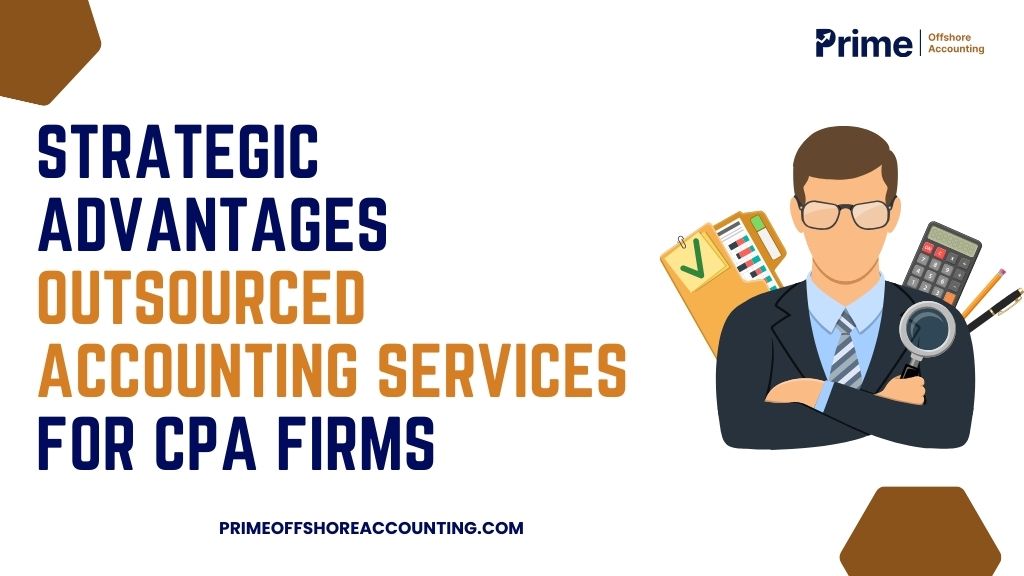Table of Content
- 1 Why Should CPA Firms Consider Outsourcing Accounting?
- 2 What Are the Different Types of Outsourcing Models for CPA Firms?
- 3 How to Choose the Right Outsourcing Partner for Your CPA Firm?
- 4 What Are the Steps Involved in Outsourcing Accounting for CPA Firms?
- 5 Frequently Asked Questions
- 5.1 What is outsourcing accounting and how can it benefit CPA firms?
- 5.2 Why is an improved approach to account management important for CPA firms?
- 5.3 What are some common accounting tasks that can be outsourced by CPA firms?
- 5.4 How can outsourcing accounting help CPA firms stay up to date with changing regulations and compliance requirements?
- 5.5 Are there any risks associated with outsourcing accounting for CPA firms?
- 5.6 How can CPA firms find the right outsourcing partner for their accounting needs?
Outsourcing accounting has become a popular choice for CPA firms looking to streamline operations and improve efficiency. The numerous benefits of outsourcing include cost savings, increased efficiency, access to expertise, and more time for client-facing activities.
Additionally, the different types of outsourcing models available for CPA firms, how to choose the right outsourcing partner, and the steps involved in outsourcing accounting services will be discussed. This exploration delves into the world of outsourcing accounting for CPA firms and how it can revolutionize a firm’s approach to account management.
Why Should CPA Firms Consider Outsourcing Accounting?
CPA firms may find it advantageous to outsource accounting services in order to streamline processes, improve efficiency, and concentrate on strategic initiatives like business growth.
Through outsourcing, firms may realize cost-effectiveness by eliminating the need to recruit and train in-house staff, leading to significant reductions in operational expenses. Additionally, outsourcing provides access to specialized expertise in areas such as tax compliance and financial reporting, ensuring the delivery of high-quality services to clients. Outsourced solutions typically include enhanced data security protocols to safeguard sensitive financial information from cyber threats. The incorporation of advanced technology in outsourced services enhances efficiency by automating repetitive tasks, allowing staff to allocate more time to offering value-added services to clients, ultimately enhancing client satisfaction.
1. Cost Savings
Outsourcing accounting has the potential to generate significant cost savings for CPA firms, which can positively impact their financial well-being and long-term viability. By entrusting routine accounting responsibilities to specialized outsourcing providers, CPA firms can streamline their operations, enabling their internal teams to concentrate on more strategic activities such as financial planning and client relationship management.
This shift in focus not only improves efficiency but also elevates the firm’s overall productivity and client satisfaction levels. Outsourcing firms typically offer advanced technology solutions and expertise that can further enhance processes and provide valuable insights for knowledge-based decision making, ultimately contributing to the long-term success of the firm.
2. Increased Efficiency
Outsourcing accounting services can improve efficiency within CPA firms through the integration of technology, process streamlining, and time-saving measures. The utilization of technology is essential for enhancing efficiency as it enables the automation of repetitive tasks, reducing the potential for errors and freeing up resources for more strategic endeavors. Streamlining processes with outsourced accounting services can lead to decreased turnaround times, facilitating faster decision-making processes and boosting client satisfaction levels. The emphasis on innovation in outsourced solutions guarantees the deployment of cutting-edge tools and techniques, enhancing performance metrics and maintaining quality assurance standards.
3. Access to Expertise
Outsourcing accounting offers CPA firms access to expertise, including virtual CFO services, which can aid in professional development and improve client engagement.
Through virtual CFO services, CPA firms can access specialized knowledge and skills that may not be readily available internally. This access to external expertise allows firms to provide clients with strategic insights, aiding in decision-making and navigating complex financial environments.
Outsourcing contributes to a broadening of industry knowledge, as virtual CFOs bring insights from working with diverse clients across various sectors. This exposure fosters innovation and strategic planning within CPA firms, positioning them for long-term success in a constantly changing market.
4. More Time for Client-Facing Activities
When accounting tasks are outsourced, CPA firms can allocate more time to client-facing activities, promoting strategic partnerships and increasing client satisfaction.
This shift enables CPA firms to concentrate on delivering personalized services and tailored solutions to their clients, leading to an enhancement in overall client satisfaction. By delegating routine accounting responsibilities to specialized outsourcing partners, CPA firms can streamline their operations, minimize errors, and ensure adherence to evolving regulations.
By establishing a more effective workflow, CPA firms can assign resources to nurturing robust client relationships through transparent communication and showcasing credibility. This approach not only improves client retention but also amplifies referrals and bolsters the firm’s reputation in the industry.
What Are the Different Types of Outsourcing Models for CPA Firms?
CPA firms have the option to select from various outsourcing models, which include offshore, nearshore, and onshore options, each offering distinct benefits and considerations.
Offshore outsourcing entails delegating tasks to service providers situated in different countries, typically in regions with lower labor costs. While this can lead to significant cost savings for CPA firms, challenges such as cultural differences and time zone disparities may emerge.
Nearshore outsourcing, on the other hand, involves collaborating with service providers in neighboring countries or regions, providing advantages such as geographic proximity and improved communication.
Onshore outsourcing, which entails partnering with domestic service providers, offers benefits like better regulatory compliance and proximity to the domestic market.
1. Offshore Outsourcing
Offshore outsourcing for CPA firms refers to the practice of assigning accounting tasks to external providers situated in different countries. This approach helps in mitigating risks and gaining access to global industry standards.
This strategy allows CPA firms to leverage the skills of professionals in regions with lower labor costs, resulting in cost savings while maintaining quality standards. Outsourcing activities such as compliance monitoring and efficient data handling enables firms to concentrate on their core functions and strategic endeavors. Remote collaboration plays a critical role in this framework, enhancing communication and project management across international borders. Strict data security protocols are put in place to protect sensitive financial data, ensuring confidentiality and adherence to regulations.
2. Nearshore Outsourcing
Nearshore outsourcing enables CPA firms to collaborate with external providers in neighboring countries, promoting effective communication, seamless processes, and strategic partnerships.
The proximity of nearshore outsourcing not only improves communication but also allows for real-time interactions and project management. Through nearshore partnerships, CPA firms benefit from shared time zones, resulting in faster response times and improved workflow coordination. Physical closeness to the outsourcing team facilitates better cultural alignment, aiding in the establishment of common objectives and cooperative efforts. Face-to-face interactions also enhance transparency, reinforcing the bond between the CPA firm and the external provider and cultivating trust and dependability.
3. Onshore Outsourcing
Onshore outsourcing involves collaborating with domestic service providers, offering advantages such as enhanced quality assurance, close oversight, and detailed performance metrics for improved client retention.
Working with local providers ensures that CPA firms can maintain high levels of service quality due to the hands-on approach that onshore outsourcing allows. The meticulous oversight provided by local teams fosters a sense of accountability and responsiveness, leading to efficient resolution of any issues that may arise during project execution. The utilization of performance metrics enables a systematic evaluation of service delivery, helping CPA firms continuously optimize their processes and exceed client expectations.
This focus on quality and client satisfaction ultimately contributes to increased client retention rates and long-term business success.
How to Choose the Right Outsourcing Partner for Your CPA Firm?
The process of selecting the ideal outsourcing partner for a CPA firm involves assessing factors such as expertise, communication skills, security measures, technology infrastructure, and flexibility for scalable solutions.
Experience in handling financial processes specific to the accounting industry is a key consideration when choosing an outsourcing partner. A reputable partner with a track record of effectively managing complex accounting tasks can offer valuable insights and enhance efficiency for the firm.
Effective communication is crucial for seamless collaboration, ensuring that the firm’s needs are clearly understood and promptly addressed. Strong security measures and advanced technology infrastructure are vital for protecting sensitive financial data from cyber threats and breaches.
1. Evaluate Their Expertise and Experience
When evaluating an outsourcing partner, it is crucial to consider factors such as their expertise, industry experience, consulting capabilities, and commitment to continuous improvement.
An outsourcing partner’s expertise can offer valuable insights and guidance to CPA firms on managing complex financial tasks efficiently. The practical solutions provided by a reputable partner, based on hands-on experience, are aligned with industry best practices. Their advisory services deliver tailored strategies that address the specific requirements of accounting firms.
Industry knowledge is essential for recognizing market trends and adapting outsourcing services accordingly, while a focus on continuous improvement ensures that processes adapt to changing industry dynamics, ultimately enhancing the quality of services available to CPA firms.
2. Consider Their Communication and Collaboration Abilities
Effective communication and collaboration are important attributes to consider when choosing an outsourcing partner for your CPA firm, ensuring transparency, a client-centric approach, and responsive problem-solving. These qualities are crucial for fostering a seamless working relationship with your outsourcing partner, as they enable open dialogue, quick decision-making, and a shared understanding of goals and expectations.
By maintaining a strong line of communication, both parties can address any issues promptly, identify opportunities for improvement, and work together towards achieving mutual success. A collaborative and responsive partnership encourages innovation, promotes efficiency, and builds trust, laying the foundation for a long-term and fruitful collaboration.
3. Look at Their Security Measures
Security measures play a crucial role in the evaluation of potential outsourcing partners for CPA firms. It is important to ensure confidentiality, data security, compliance, and trustworthy handling of sensitive information.
This aspect is vital for safeguarding the integrity of client data, financial information, and proprietary processes. By implementing robust data security protocols, outsourcing partners can show their dedication to protecting the sensitive information they are entrusted with. Strict adherence to compliance standards ensures that sensitive data is handled ethically and legally, thereby reducing risks associated with data breaches and regulatory penalties.
Trust is established through secure data handling practices, transparent communication, and maintaining a reputation for upholding the highest standards of confidentiality and security in all operations.
4. Assess Their Technology and Infrastructure
The technology and infrastructure of an outsourcing partner are essential for improving accounting processes for CPA firms. They enable automation, cloud-based solutions, digital transformation, and efficient oversight.
Such evaluation of the partner’s technology stack and infrastructure is crucial as it directly impacts the firm’s ability to streamline operations, improve efficiency, and ensure data security. By leveraging advanced technologies and robust infrastructure, CPA firms can automate repetitive tasks, access real-time data through cloud-based platforms, and embark on a journey of digital transformation. Efficient oversight in outsourced solutions ensures compliance, accuracy, and timely delivery of financial information, enabling firms to focus on strategic decision-making and client service.
5. Check for Flexibility and Scalability
Flexibility and scalability are important factors to consider when evaluating an outsourcing partner, ensuring the ability to adapt, provide 24/7 support, and deliver services proactively to meet the changing needs of CPA firms.
Examining the flexibility of an outsourcing partner enables CPA firms to seamlessly adjust to evolving requirements, remaining adaptable in today’s dynamic business environment.
Scalability features guarantee that the partner can expand alongside the firm, accommodating increased demands effortlessly.
Availability of round-the-clock support ensures that help is readily accessible, regardless of time zones or unexpected situations.
Proactive approaches to service delivery demonstrate a partner’s dedication to effectiveness and customer satisfaction, essential for staying competitive in the industry.
What Are the Steps Involved in Outsourcing Accounting for CPA Firms?
The outsourcing of accounting for CPA firms involves several steps, including:
- Defining goals
- Identifying services to outsource
- Selecting a partner
- Establishing communication channels
- Monitoring performance
Setting clear goals and objectives is essential to provide a framework for the outsourcing process. CPA firms must evaluate which accounting services are best suited for outsourcing based on their specific needs. Choosing a partner requires thorough research into factors like expertise, experience, and credibility to ensure a successful collaboration. Effective communication and collaboration mechanisms, such as regular updates and feedback sessions, are crucial for integrating workflows smoothly. Implementing performance monitoring tools and metrics is important for assessing the quality of outsourced services and making necessary adjustments for optimization.
- Define Your Goals and Objectives
- The first step in outsourcing accounting involves defining specific goals and objectives that are in line with strategic planning, client needs, regulatory compliance, and industry standards for CPA firms.
By clearly outlining these goals, businesses can ensure that their outsourcing partners understand the direction and expectations, thereby establishing a strong foundation for collaboration. Well-defined goals allow outsourced accounting services to be customized to meet specific client needs and ensure full compliance with relevant regulations and industry standards. This strategic alignment promotes efficiency, improves the quality and accuracy of financial reporting, enhances decision-making, and contributes to overall business success.
1. Identify the Services You Want to Outsource
Determining the specific accounting services to outsource, such as bookkeeping, tax preparation, financial reporting, compliance management, and risk assessment, is a critical step for CPA firms. It is essential for CPA firms to carefully evaluate their core competencies and strategic objectives to ensure that the outsourced accounting services align with these parameters.
By aligning outsourced services with their strengths and overall business goals, firms can optimize their operations, enhance efficiency, and drive growth. Attention should be given to the expertise, experience, and reliability of the outsourced accounting service provider to guarantee smooth collaboration and high-quality deliverables. Considerations of data security, regulatory compliance, and the ability to customize services according to specific needs are also pivotal in the selection process.
2. Choose the Right Outsourcing Partner
The process of selecting an outsourcing partner involves evaluating the capabilities of vendors, assessing audit support services, utilizing analytics tools, and ensuring strong oversight for outsourced accounting procedures.
Vendor assessment is a key aspect of determining whether a potential partner aligns with the organization’s specific needs and standards. This evaluation includes factors such as experience, expertise, scalability, and cultural compatibility.
The availability of audit support services is essential for maintaining compliance and data security. By confirming the outsourcer’s capacity to assist with audits and provide necessary documentation, companies can reduce risks and promote transparency.
Using analytics tools enables data-driven decision-making and performance monitoring, which can improve operational efficiency and strategic planning within the outsourcing arrangement.
3. Set Up Communication and Collaboration Processes
Establishing robust communication and collaboration channels is crucial in outsourcing accounting for CPA firms, facilitating transparency, effective problem-solving, trust-building, and improved client retention.
Efficient communication supports a streamlined flow of information between the CPA firm and the outsourced accounting team, enabling timely updates, smooth coordination, and prompt issue resolution. By keeping communication channels open, both parties can address any discrepancies promptly, establishing a basis of mutual trust and reliability.
This transparent approach not only enhances the quality of services provided but also solidifies the partnership with the outsourcing provider, resulting in a more productive and enduring relationship that benefits the clients as well.
4. Monitor and Evaluate Performance
Continuous monitoring and evaluation of performance metrics, utilizing advanced reporting tools, are necessary for identifying efficiency gains, cost savings, and driving business transformation through outsourcing for CPA firms.
By consistently tracking key performance indicators, such as turnaround time for financial reports, accuracy of data processing, and client satisfaction levels, CPA firms can proactively address any potential issues and capitalize on successes. This proactive approach ensures that the outsourced accounting processes not only meet but exceed stakeholders’ expectations.
The access to comprehensive reporting tools enables firms to make data-driven decisions, enabling them to optimize resource allocation, enhance service quality, and explore new revenue streams. Leveraging data analysis plays a vital role in this decision-making process, providing valuable insights and supporting strategic enhancements that align with long-term business objectives.
Frequently Asked Questions
What is outsourcing accounting and how can it benefit CPA firms?
Outsourcing accounting is the practice of hiring a third-party to handle accounting tasks and processes for a company. For CPA firms, outsourcing accounting can lead to improved efficiency, cost savings, and a more specialized and streamlined approach to account management.
Why is an improved approach to account management important for CPA firms?
An improved approach to account management can help CPA firms deliver better services to their clients by allowing them to focus more on strategic and value-added tasks rather than spending time on routine accounting tasks. This can lead to increased client satisfaction and retention.
What are some common accounting tasks that can be outsourced by CPA firms?
CPA firms can outsource a variety of tasks such as bookkeeping, tax preparation, payroll processing, financial reporting, and accounts payable and receivable management. By outsourcing these tasks, CPA firms can save time and resources and have more capacity to take on new clients or projects.
How can outsourcing accounting help CPA firms stay up to date with changing regulations and compliance requirements?
Outsourcing accounting to a specialized firm can ensure that the CPA firm’s clients’ books are kept in compliance with the latest regulations and standards. Dedicated accounting firms have the resources and expertise to stay updated on changes in the industry and implement them effectively for their clients.
Are there any risks associated with outsourcing accounting for CPA firms?
Outsourcing accounting can have some risks, such as the potential for miscommunication and security breaches. However, these risks can be mitigated by carefully selecting a reputable and reliable outsourcing partner and implementing proper data security measures.
How can CPA firms find the right outsourcing partner for their accounting needs?
When looking for an outsourcing partner, CPA firms should consider factors such as their reputation, experience, and expertise in the industry. It is also important to evaluate their data security measures and communication processes to ensure a smooth and successful partnership.








